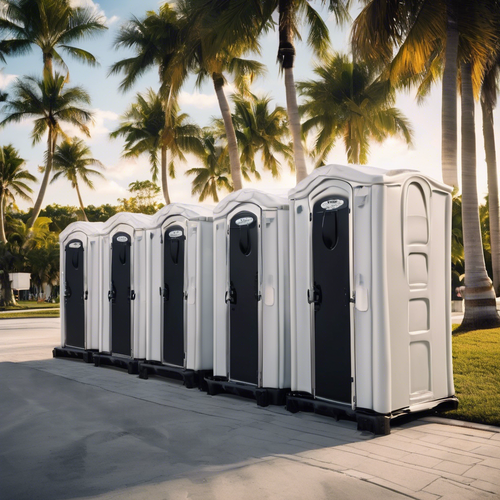Portable Restrooms: Providing Respectful Amenities at Miami’s Outdoor Religious Ceremonies
Under the vast Miami sky, where the turquoise waters meet the vibrant cityscape, a diverse tapestry of faith unfolds. From sunrise prayers on South Beach to elaborate Hindu festivals in Little India, outdoor religious ceremonies are a cornerstone of the city’s cultural identity. But behind the spectacle of devotion lies a practical challenge: ensuring respectful and sanitary restroom facilities for participants. The seemingly mundane becomes profoundly significant when considering the diverse needs and sensitivities of various religious communities. Are Miami’s current provisions truly meeting the mark?
The Challenge of Accommodating Diverse Religious Practices
Providing adequate portable restrooms isn’t merely about ticking a box on an event planning checklist. It’s about respecting deeply held beliefs and traditions. Many faiths have specific rituals around hygiene and purification before prayer or religious observance. The availability of clean water for ablutions, the separation of facilities for men and women, and even the orientation of the restrooms themselves can be critical considerations. 🕌 🧽
Consider the Islamic tradition of Wudu, the ritual washing performed before prayer. Basic portable restrooms often lack the necessary facilities for this practice, forcing individuals to seek out alternative, often inadequate, solutions. Similarly, certain Orthodox Jewish customs require separate facilities and specific cleaning protocols. Ignoring these needs can lead to discomfort, inconvenience, and even exclusion for devout participants. ✡️
Miami’s Current Landscape: A Mixed Bag
Miami-Dade County has regulations in place for temporary events, including requirements for portable restrooms based on attendance. However, anecdotal evidence suggests a significant gap between policy and practice. Event organizers, often under pressure to minimize costs, may opt for the bare minimum, neglecting the specific needs of religious attendees. Furthermore, enforcement of existing regulations can be inconsistent, leaving vulnerable communities underserved. 🚧
A recent survey conducted by the Interfaith Council of Greater Miami revealed that nearly 60% of religious leaders felt that current portable restroom provisions at outdoor events were inadequate for their congregations. Complaints ranged from insufficient numbers of restrooms to lack of cleanliness and accessibility issues. This dissatisfaction highlights the urgent need for a more nuanced and proactive approach. 📊
Accessibility: A Moral and Legal Imperative
Beyond religious considerations, accessibility is paramount. The Americans with Disabilities Act (ADA) mandates that temporary events provide accessible restrooms for individuals with disabilities. However, many portable restroom rentals fail to meet these standards, leaving disabled attendees marginalized and excluded. The lack of ramps, grab bars, and sufficient space within the units poses a significant barrier to participation. ♿
Furthermore, the issue extends beyond physical disabilities. Elderly attendees and those with medical conditions also require accessible and comfortable facilities. Ensuring that portable restrooms are well-maintained, properly ventilated, and equipped with features like hand sanitizers is crucial for promoting public health and well-being. 🧑⚕️
Innovative Solutions and Best Practices
The good news is that solutions exist. Several companies specializing in portable restroom rentals are now offering enhanced options that cater specifically to the needs of diverse religious communities. These include units with built-in ablution stations, separate male and female facilities, and culturally sensitive designs. 🚿
Moreover, technology can play a vital role. Smart restroom monitoring systems can track usage patterns and alert event organizers when cleaning or restocking is required. This proactive approach can help maintain hygiene standards and prevent shortages, ensuring a positive experience for all attendees. 💡
Some forward-thinking event organizers are also partnering with local religious leaders to gain a better understanding of their communities’ specific needs. This collaborative approach allows for customized solutions that are both respectful and effective. 🙏
«Providing adequate and respectful restroom facilities is not just a logistical concern; it’s a matter of human dignity. When we create inclusive and welcoming environments, we strengthen the bonds of community and foster a deeper sense of belonging,» says Reverend Dr. Martin Luther King, Jr. (paraphrased for contemporary application).
The Path Forward: Collaboration and Awareness
Addressing the challenges of portable restroom provisions at Miami’s outdoor religious ceremonies requires a concerted effort from event organizers, government agencies, and religious communities themselves. Increased awareness, stricter enforcement of existing regulations, and a willingness to invest in innovative solutions are essential. 🤝
Ultimately, the goal is to create a more inclusive and respectful environment for all participants, regardless of their faith or physical abilities. By prioritizing the basic needs of attendees, Miami can further enhance its reputation as a vibrant and welcoming city that celebrates its rich cultural diversity. 🎉
